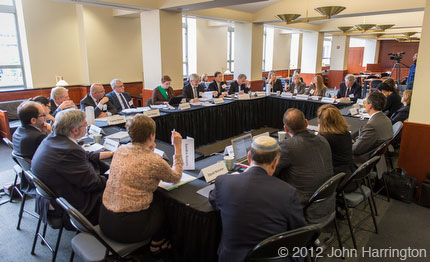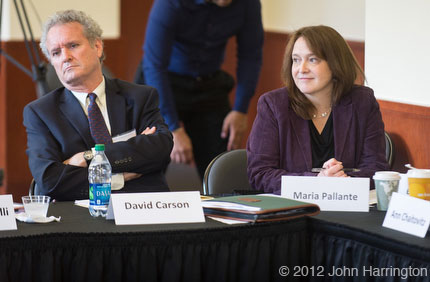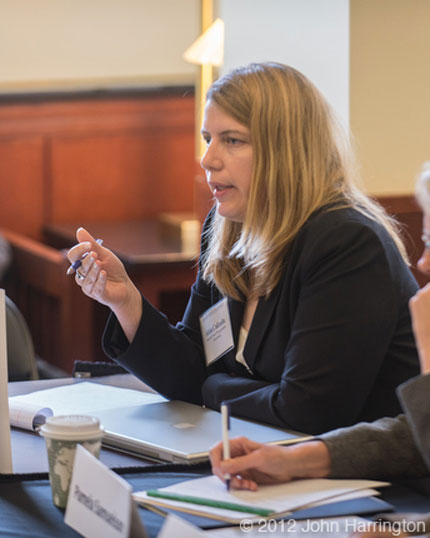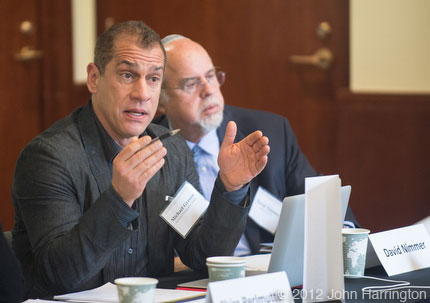 The US Copyright Office held a roundtable discussion today in Washington DC, at the George Washington University Law School on the subject of how (and if) to propose implementing a form of a Small Claims Court for copyright infringement claims. The roundtable was filled with rights-holders from around the country who came to share their views on the benefits and challenges that a Small Claims Court venue would have on rights-holders.
In his opening remarks, David Kappos, the Under Secretary of Commerce for Intellectual Property and Director of the United States Patent and Trademark Office, said that the issue of an Intellectual Property "Small Claims" system is a "burning platform," that must be addressed.
The US Copyright Office held a roundtable discussion today in Washington DC, at the George Washington University Law School on the subject of how (and if) to propose implementing a form of a Small Claims Court for copyright infringement claims. The roundtable was filled with rights-holders from around the country who came to share their views on the benefits and challenges that a Small Claims Court venue would have on rights-holders.
In his opening remarks, David Kappos, the Under Secretary of Commerce for Intellectual Property and Director of the United States Patent and Trademark Office, said that the issue of an Intellectual Property "Small Claims" system is a "burning platform," that must be addressed.
(Continued after the Jump)
The Registrar of Copyrights, Maria Pallante (below right) listened intently throughout the discussions, as did David Carson (below left), counsel to the Copyright Office. Pallante is looking to increase the number of deposits, and to evolve the online registration system in a way that works for copyright owners, as well as make protecting copyrights easier for copyright holders.

The National Press Photographer's Association Advocacy Chair, Alicia Wagner Calzada, a highly regarded photographer, and also an attorney for the NPPA, make a number of points - among them the challenge that if the issue of fair use could 'eject' a claim from the Small Claims Court, that, for many photojournalists (and members of the NPPA) whose work is of a highly newsworthy nature, this is a common defense of infringements that NPPA members face, and would be problematic.

Calzada (above) said of the meeting "One thing appears clear--this is not a simple fix. The event was very productive in terms of shining a light on the challenges to crafting a small claims solution for copyright infringement. It is clear that there are genuine obstacles, including some constitutional issues. What I took away from the discussion is that the challenges are not insurmountable. It is, however, important to create a system that will uphold constitutional scrutiny or it will be a wasted effort."
Also on hand was counsel for the American Society of Media Photographers (below right rear), Victor Perlman, and Executive Director Eugene Mopsik (below center). The ASMP has maintained an ongoing relationship with the Copyright Office and Congress in many issues facing photographers today, and has done much to further photographers' interests and protect their rights. Mopsik said of the meeting "The GW Roundtable brought together some of the best IP experts from industry and education along with representatives from a broad spectrum of trade associations and interest groups. The day was spent in a combination of informational presentations followed by discussion of specific proposals for "Small Claims" solutions. It think that it was very valuable for Maria Pallante and the other Copyright Office and PTO representatives. It gave all of the attendees much to think about and was very useful in unveiling issues previously not considered."

On hand for the American Photographic Artists, Michael Grecco (below left), and the author of APA's proposal and highly respected copyright attorney David Nimmer (below right) spoke about the challenges of implementing a Small Claims Court and offered a solution to make it work. Grecco commented "The session was a think tank with some of the greatest minds in Copyright sussing out the possibilities of a Fast Track, or Small Claims system for Copyright issue." Interestingly, one of APA's comments that were a part of their proposal offerred that "The best protection for low-economic-value claims would arise from making automatic the recovery of attorney’s fees and statutory damages by prevailing plaintiffs. By contrast, current law affords those remedies only for the benefit of copyright proprietors who, prior to the commencement of infringement, have registered their work in the records of the United States Copyright Office. Accordingly, under existing law, infringement of then-unregistered works remains beyond practical redress." The proposal calls for a Small Claims Court to be "applicable to simple copyright infringement cases that seek to recover no more than $80,000. Consenting parties can have their positions quickly evaluated by a Magistrate Judge sitting in the appropriate United States District Court in which the case is pending."

ASMP's Mopsik said of the idea of Small Claims "ASMP supports an ADR solution to small claims and believes that it should be as easy and simple for a photographer to navigate as possible." and the NPPA's Calzada said "virtually any solution is years away, though I know that for photographers who deal in daily deadlines and constant infringements, it cannot happen soon enough. Hopefully, it will be worth the wait." APA's Grecco said "I was very proud that APA's proposal, written by attorney David Nimmer, with Special Counsel Edward C. Greenberg, it played a major role in todays discussions. It was the one proposal that could be enacted relatively quickly and easily in the existing Federal Court system and had a good chance of sustaining a Constitutional challenge."
Related - Comments & Proposals Submitted:
Please post your comments by clicking the link below. If you've got questions, please pose them in our Photo Business Forum Flickr Group Discussion Threads.
No comments:
Post a Comment
COMMENT GUIDELINES
Every month, tens of thousands of visitors come to Photo Business News, and approximately 2,000 readers get PBN via RSS feeds. As we approach three years of blogging (in one form or another) PBN has matured, and has, as one might expect, attracted some less-than-mature readers, which, in turn, turns to commenters with their own agendas.
Following are our Terms of Service (TOS) for commenting on the blog posts:
-------------------
1. Comment Spam - we have had a ton of spam from countries like Russia, Japan, China, and so on. It interferes with the discourse, and is one of the prime reasons we are moving to moderation. All one need to is look back a few months to see the blog posts I haven't had time to clean up from this type of spam to see that moderation is needed for this reason alone. In addition, if your comment is not germane to the point being discussed, it too becomes spam. It will be deleted.
2. Over time, some pretty irrational challenges and attacks have been levied against me, and that's ok if you disagree with me, just don't make it personal on me, or anyone else. Doing so means your comment won't make it out of moderation, so don't waste your time. In addition, it would be a shame for you to make a really great point that everyone would benefit from reading, and include personal attacks on me, or other commenters, because we don't edit comments, they're either in, or they're out.
3. Over at the Photo Business News Flickr forum, (here) there are almost 2,000 members and a good opportunity to get your questions answered there. If you have a suggestion for a blog topic, there's a link to make that suggestion on every page of the blog.
4. It is the policy of Photo Business News that if there is a YouTube, Vimeo, Viddler, Hulu or any other video service online, we can post it here using the embedding players for those services (which often insert ads into the playback). We can't know if what might normally be considered a copyrighted work that you would think might not be allowed on, say, YouTube, in fact has been agreed to between the copyright holder and YouTube. So, if you have a question or concern, visit those sites, and flag the content you believe is problematic. In addition, we adhere to standards for quoting and citing other content, with attribution and where possible, a link to that content.
5. ANONYMOUS COMMENTS - For several years now, we've given free reign to anonymous commenters, and a small fraction of those were beneficial to the readership. It is our opinion that anonymous commenters would best be from someone who, for example, should their identity be revealed, could pose job security or economic problems for them. So to that end, unless your comment is significantly beneficial, anonymous comments won't get moderated in. If you wish to make an anonymous comment and you want to send me an e-mail identifying yourself (which I will not reveal), that would be helpful, and will increase your chances of getting your comments posted. Oh, and don't go creating a fake Blogger ID just to get in - blank Blogger ID's are just one step removed from plain anonymous postings. The more discourse where people know who each other are, the better. David Hobby, of Strobist fame summed it up best in his TOS: "Nothing looks more weenie and pathetic than sniping, critical, anonymous comments."